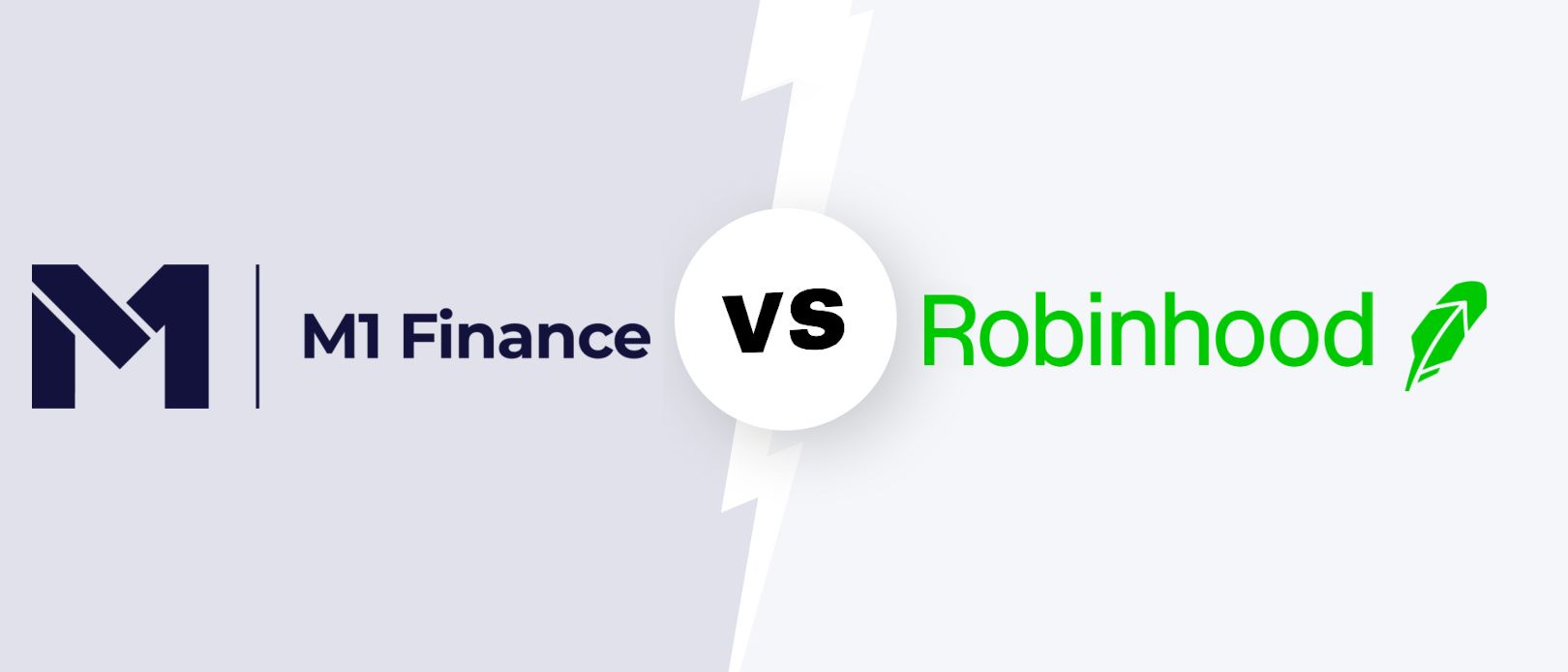
M1 Finance vs. Robinhood -- Which one is better for you?
Moneywise.com / Moneywise.com
Updated: October 31, 2023
We adhere to strict standards of editorial integrity to help you make decisions with confidence. Please be aware that some (or all) products and services linked in this article are from our sponsors.
We adhere to strict standards of editorial integrity to help you make decisions with confidence. Please be aware that some (or all) products and services linked in this article are from our sponsors.
Robinhood pioneered commission-free stock trading that changed how investors trade forever. Since then, however, other brokers have followed suit with highly competitive offerings. One such competitor is M1.
Both brokers offer a range of investment options suitable for different types of investors beyond zero-commission trading and the buying and selling of stocks. Although the two brokerage companies offer intuitive and easy-to-use platforms, it ‘s important to consider their features before you invest your money.
This review compares M1 vs. Robinhood to help you decide which commission-free stock trading platform best suits your investment needs.
The Short Version
- M1 Finance is best for long-term or passive investors interested in investing and going about their lives.
- Robinhood is good for active investors who prefer cryptocurrency trading, options trading, and day trading.
- M1 offers automated investing, borrowing, a credit card, banking, and retirement investment accounts all in one platform.
- Robinhood has an easy-to-use platform, making it ideal for beginner investors who want to learn how to buy and sell individual stocks, options, ETFs, or cryptocurrency.
M1 vs. Robinhood: Overview
What Is M1?
M1 (formerly M1 Finance) is a U.S.-based financial services company that offers commission-free stock trading and several other investment options. Founded in 2015 by Brian Barnes, M1 Holdings Inc. (including its affiliates, M1 LLC and M1 Spend LLC), M1 is popular among investors who want a wider range of financial products.
The all-in-one personal money management company gives users access to borrowing, investing, and spending services. The platform provides smart money management and automated investing for the passive investor, making it an all-around personal finance tool.
What Is Robinhood?
In 2013, Vladimir Tenev and Baiju Bhatt disrupted the way Americans trade stocks by introducing Robinhood – the free stock trading app. Instead of charging commissions on trades, the financial service company makes money from margin lending, order flow, interests, rehypothecation, and upgraded service fees.
The U.S.-based broker has a user-friendly platform that allows investors to access the stock market to trade stocks and ETFs. It also offers options trading.
With Robinhood Crypto, any investor on the platform can tap into the cryptocurrency market. However, only seven cryptocurrencies are currently listed on the Robinhood investment platform.
Read our full Robinhood review
M1 vs. Robinhood: Key features
M1's unique features:
- M1 Borrow. M1 Borrow is the broker’s portfolio lending program for investors who want to use margin. With M1 Borrow, users get some of the lowest margin rates in the industry. Investors can borrow up to 40% of their invested balance and enjoy rates as low as 6.75% with M1 Plus.
- M1 Plus. M1 Plus is a premium account option that offers 1% cashback on your purchases and 3.30% APY on your balance. With M1 Plus, investors have access to the Smart Transfers feature that allows automatic cash transfers between M1 Invest and M1 Spend.
- M1 Pie. One of the unique features of M1 is the way it trades stocks, ETFs and close-ended funds. It allows users to trade in pies, which are essentially a selection of securities. Investors can build their own pies or trade one already offered by the broker. Each pie can consist of up to 100 slices of stocks, ETFs and close-ended funds.
From this M1 overview, it's clear that the broker’s philosophy hinges on three main pillars: investing, borrowing, and spending. This could make the platform an excellent choice for investors who want an all-in-one personal management broker.
Robinhood's unique features:
- Robinhood Gold account. Investors can upgrade to a Robinhood Gold account to trade on margin (at a low 2.5% margin rate), access exclusive market research, and receive Level II data. However, you must have at least $2,000 to qualify.
- Low-cost trading. Robinhood offers low-cost and commission-free stock trading. Investors interested in day trading will find the low fees quite attractive.
- Virtual library: One of the reasons beginners find Robinhood more suitable is because they have access to a virtual library. The library is a rich resource containing various topics on options trading and investing in general.
- Extended hours. Traders can enjoy more trading hours on the Robinhood trading platform. Unlike M1 Finance, which lacks this feature, Robinhood offers pre-market and after-hours trading. Pre-market opens at 9:00 a.m. ET – 30 minutes earlier than the traditional market hours on regular business days. After-hours trading ends at 6:00 p.m. ET – two extra hours after the usual market hours on regular business days.
- Self-directed trading. Robinhood allows traders to invest in various asset classes, including stocks, ETFs, options, and cryptocurrencies.
Robinhood is a suitable investing app for beginners interested in day trading because it allows investors to trade without worrying about high fees. It could also be a good fit for margin trading.
M1 vs. Robinhood: Available investment options
Most brokers offer stocks and ETFs and M1 is no different. Even if you are a small investor, you can leverage the fractional shares investing available on the platform to buy big stocks. However, investors on M1 are limited to investing in individual stocks and ETFs.
On the other hand, Robinhood supports cryptocurrency trading and allows investors to buy fractional shares. Users can buy stocks, ETFs, ADRs, and the broker allows options trading without charging a commission.
Unfortunately, both brokers do not support a few other investment options, including CDs, mutual funds, futures, forex and bonds.
M1 vs. Robinhood: Trading platform and usability
Both platforms are very user-friendly and offer a streamlined experience. M1’s website gives users clear performance metrics with several tabs that show portfolio holdings and activities. The platform is easy to navigate, with simple buttons to let you sell, buy, or rebalance. Investors have access to a detailed breakdown of their allocation using graphs.
On the other hand, Robinhood is known for its extreme simplicity, demonstrated in the platform's design. Even a newbie can quickly navigate and find their way on the intuitive platform. The platform provides IPO announcements, transaction reports, Robinhood updates, and a newsfeed of customizable stocks lists.
M1 vs. Robinhood: Account type
M1 Finance offers custodial and joint accounts, which allows the easy transfer of account ownership between investors.
The broker also offers credit card and margin accounts.
In addition to all of these, M1 offers a few different types of individual retirement accounts, including Traditional IRAs, Roth IRAs and SEP IRAs.
Robinhood customers, meanwhile, have fewer account options. You can only access a margin account for borrowing if you have a Robinhood Gold account as an investor.
Find out more: How to Get Rich From Stocks
M1 vs. Robinhood: Fees
Robinhood is famous for its commission-free trading. The broker doesn’t charge a fee for trading stocks, ETFs, cryptocurrencies, and options. Plus, there's no charge for account maintenance, making it one of the best low-cost brokers in the industry.
However, investors who choose a Robinhood Gold account for margin trading will pay a $5 monthly account maintenance fee.
Like Robinhood, M1 also offers a commission-free stock and ETF trade. And while it doesn’t charge customers for account maintenance, investors with zero activity for more than 90 days will pay a fee for account inactivity.
Overall, both brokerage firms offer lower transaction fees than many other brokers. However, closing out your account attracts charges. Robinhood charges a $75 fee for account transfers, while M1 charges $100 for the same transaction.
M1 vs. Robinhood: Customer service
M1 provides good customer service with several options. These include:
- Phone support
- Email support with a maximum of 24 hours response time
- Instant chatbox
In addition to all of these, M1 has a robust help center on its website with plenty of helpful articles that provide easy-to-understand answers to the most common investment-related questions.
In the past, Robinhood was notorious for offering very limited customer service. But it's recently made some strides to improve in this area. In October 2021, it announced the launch of 24/7 phone support. Customer service calls can be requested from right inside the Robinhood app.
M1 vs. Robinhood: Mobile app
M1 has a highly-rated mobile app, particularly for its ease of use. The app is available for Android and iOS devices and comes with just about every feature you will find on the website.
Robinhood also has a full-featured mobile app for Android and iOS devices. The app is specifically designed with the new investor in mind, so there aren’t too many advanced features. However, it is easy to use and allows quick and easy trading.
M1 vs. Robinhood: Security
Both brokers take security very seriously and have several measures in place to prevent fraud and hacks. They also protect investors’ funds in case any of the brokers go under.
M1 security features include two-factor authentication and military-grade 4096-bit encryption. Investors’ investments are covered by SIPC insurance, and deposits are FDIC insured.
Robinhood's security features include biometric recognition and two-factor authentication. Investors’ stock, cash, funds, and ETFs are insured. Also, investors can disconnect any unknown devices from their crypto trading account.
Pros and cons of M1
Pros
- Dynamic rebalancing: The broker can rebalance your portfolio using your new purchases to buy positions where your portfolio is underperforming.
- Provides access to many accounts: An investor can open and invest in various accounts, including a taxable account, individual retirement account, joint account, or trust.
- Supports many account types: In addition to margin, and credit card accounts, M1 allows investors to open and invest in several individual retirement account types, including SEP IRAs, Roth IRAs, and Traditional IRAs.
- Low margin rates: M1 offers one of the lowest margin rates in the industry with the M1 Borrow feature.
Cons
- No cryptocurrency trading: M1 does not support cryptocurrency trading, making it unsuitable for any investor looking to trade that asset class.
- No mutual funds, bonds and CDs: Having a truly diversified portfolio may be difficult with M1 because it limits investors to stocks and ETFs. The broker does not offer investment options such as bonds, mutual funds, and CDs.
- Not for the active investor: M1 is really built to meet the needs of passive investors. So it might not be a good fit if you're interested in short-term trading.
- Does not give investors total control: M1 may not work well for you if you want a broker that supports investing in individual positions instead of a portfolio. While you can buy and sell stocks, they must be from specific slices of your portfolio.
Pros and cons of Robinhood
Pros
- Allows for a truly diversified portfolio: Traders can trade with Robinhood crypto or invest in stocks, options, and ETFs.
- No fess or minimums: Robinhood traders don’t have to maintain a minimum balance on their trading accounts and Robinhood Gold accounts. Trading is commission-free for crypto, stocks, options, and ETFs.
- Margin trading available: Traders can perform margin trading and have access to fractional shares investing. Also, there is no per-contract options fee on the Robinhood platform.
- Easy-to-use platform: Both the website trading platform and the Robinhood app are easy to understand, navigate, and use. This makes it a great choice for any beginner investor.
Cons
- No bonds or mutual funds investing: Robinhood does not offer bonds or mutual funds. You’ll have to find another broker if you are interested in these investment options.
- Limited crypto options: While Robinhood supports investing in cryptocurrencies, investors may find having only seven crypto options listed on the trading platform quite limiting.
- Users can’t withdraw crypto funds: Investing in crypto is possible, but getting your funds out of Robinhood can be a hassle. To withdraw your crypto funds, you'll have to sell them first to convert them to fiat money.
M1 vs. Robinhood: Which broker is better for you?
Here's our final verdict: Consider choosing M1 if you're an investor with complex ownership or tax situation. Also, the platform's account types and investment options make M1 work better for the passive investor interested in long-term investing.
Robinhood, on the other hand, works best for the active trader interested in day trading. It's also a better option if you want to buy and sell crypto (despite the limited number of currencies that it offers) since M1 doesn’t support cryptocurrency trading at all as of writing.
In other words, if you are interested in borrowing and investing, M1 may be a better choice.
Lastly, keep in mind that one broker isn’t necessarily better than the other. They simply differ from each other and are suitable for different types of investors.
M1 Plus DIsclosure: M1 Plus is a $125 annual subscription offering products and services from M1 Spend LLC and M1 Finance LLC, both wholly-owned, separate but affiliated subsidiaries of M1 Holdings Inc.





